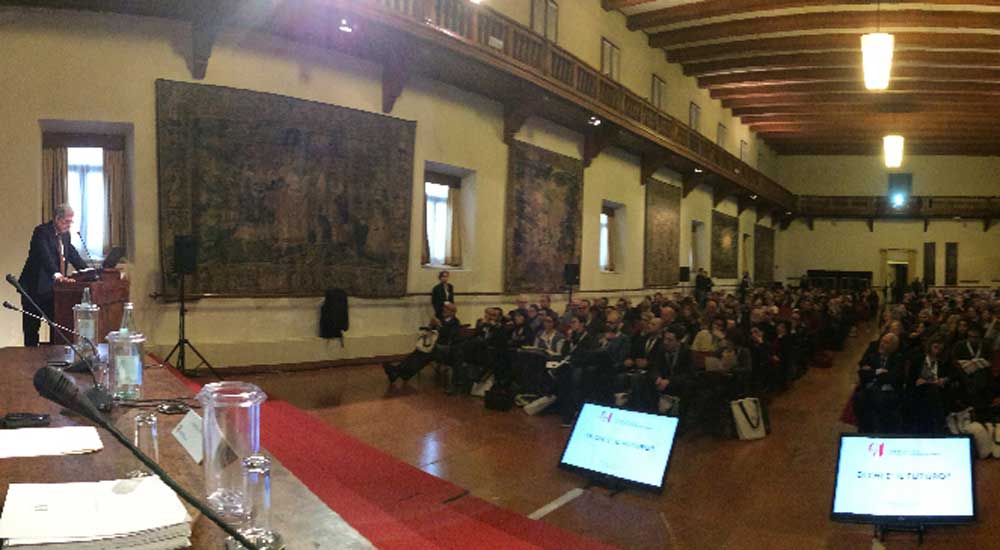L’editore americano, presidente di Farrar, Straus & Giroux, riflette sul presente e il futuro del mondo del libro (testo in inglese)
Su IlLibraio.it il testo integrale (in inglese*) letto da Jonathan Galassi (presidente della prestigiosa casa editrice Farrar, Straus & Giroux) sul tema “Gli editori di ieri e gli editori di domani” in occasione del 32esimo Seminario di Perfezionamento della Scuola per Librai Umberto e Elisabetta Mauri.
A giugno Galassi (che, tra le altre cose, ha tradotto in inglese Leopardi e Montale) pubblicherà con Guanda La musa, un romanzo (molto conteso all’ultima Fiera di Francoforte), sul potere delle idee e della letteratura, un affascinante ritratto dei protagonisti della società letteraria americana.
di Jonathan Galassi
Ladies and Gentlemen,
It’s such a pleasure and an honor to be with you here in Venice, the home of art and beauty, where the cultural values we hold dear reign serene and unchallenged. Venice will always be Venice. It hasn’t changed for centuries. Our great-grandchildren will be coming here, much as our forebears did, much as we do today, to bask in its incomparable atmosphere. Venice’s permanence, her endurance, her immortality, is something we can all rely on, congratulate ourselves about, revel in and enjoy forever.
I could go on like this for quite a while, and maybe you’d keep on nodding politely, but internally you’d be thinking, What has Jonathan Galassi been smoking? Doesn’t our naive American friend understand how threatened Venice is, how in danger of being flooded, overwhelmed, emptied out, abandoned? Yes, Venice is surpassingly beautiful, unique, irreplaceable. But Venice is dying. Her population shrinks every year. Some would say she has long been dead. Like many of Europe’s cultural capitals, she is a museum, a theme park, bypassed and inconsequential, unreal.
This debate about the survival of traditional culture, is part of our wallpaper today, so familiar we almost don’t hear it. And, to be honest, not quite everyone loves Venice. That loudmouth Futurist disrupter Filippo Tommaso Marinetti wanted to tear down its crumbling, pockmarked palaces, fill in its fetid canals, and set fire to its gondolas. (He also wanted to get rid of pasta.) Others, like my own particular hero Eugenio Montale, believe it’s the task of the present to see that the best of the past survives into the future. This seesawing between past and future, permanence and change, beauty and utility, continues, and nowhere more urgently than in our own world, the world of the book.
We, today’s publishers, critics, booksellers, tell ourselves we are the custodians and curators and first defenders of the greatest cultural artifact the world has ever known. We’re the children of the great Aldo Manuzio, the first modern publisher who shaped our calling five hundred years ago, right here in Venice. But today Aldo’s profession, what we in the United States call our industry with more than a
bit of wishful grandiosity, itself feels threatened, not unlike the jewel of a city where we are meeting.
The debates about the future of the book are our wallpaper: sagas of technological disruption and not-unrelated changes in cultural habits are the stuff of our everyday chatter. Why do online booksellers insist on selling electronic versions of books at lower and lower prices? Why are they intent on devaluing intellectual property? Is it because, as they claim, they want to expand the community of readers and sell more books to a broader public? Or do they want to control the processes of bookselling and even production themselves? Do they think they’re the publishers now? Are they our rough-and-ready collaborators, dragging us willy-nilly into the future? Are they, as we used to say a bit wistfully, our frenemies, a little bit partners and a little bit rivals? Or are they in fact our enemies pure and simple, intent on “disintermediating” us, eviscerating our business like so many others? Have we publishers been asleep at the switch while the digital revolution has overtaken us?
The disrupters’ approach to bookselling is aimed at sucking what they consider the fat out of the publishing system, much as companies like Airbnb are doing in the hotel business, cutting out the so-called middlemen to offer cut-priced services to a “democratized” group of consumers. Ranged against the price cutters are whose want to shore up the value of intellectual property, and who at the same time tend to subscribe to a more conservative, not to say pessimistic, estimation of the potential universe of readers. I myself find it hard to imagine there being enough customers out there who will pay $3 to download a great new novel to make up for the several tens of thousands who have historically been willing to pay $20 or more for a physical copy. Besides, I don’t think a new book should cost $3 in any case. But it’s easy to understand how self-serving the conservative attitude can sound. Of course publishers want to maintain prices, the cynical argument goes. They’re trying to hold on to outmoded ways of doing business in order to save their own soon-to-be irrelevant jobs. They think reading is a moonlit lagoon, a sacred enclosure for the brocaded happy few; they’re self-regarding, out-of-touch ostriches burying their heads in the sand while the acqua alta of change rises inexorably. They’re going to be sunk.
What price cutting inevitably involves, though, is a drastic diminishment in the value of an author’s work. That great
new novel is reduced to a widget, a SKU, a fungible bargain rather than a unique new creation that arouses admiration and desire. And in the process, it is the owner of the system that manages the transaction who has been allowed to decide the terms of the exchange between writer and reader, to determine the book’s value, gaining power at the expense of both creator and producer.
Jaron Lanier, a very different kind of futurist from Marinetti, in his recent book, WHO OWNS THE FUTURE, provides a chilling description of what he calls “the book as Silicon Valley would have it.” In Lanier’s Doomsday scenario, writers will be “fundamentally like performers…There will be much more information available in some semblance of book form…but overall a lower quality standard… Writing a book won’t mean as much… Overall, people will pay less to read, which will be lauded as being good for consumers, while people will earn still less from writing…in an ever-more digital world in which software swallows everything.” “By the time books have gone mostly digital,” he concludes, “the owners of the top Internet servers that route readers, probably run by Silicon Valley companies, will be more powerful and richer than ever before.”
Lanier’s nightmare vision basically eliminates the writer a as creator of her work and turns her into a worker for hire, a cog in just another supply chain network. In it, she has ceded ownership and authority over her work to the controllers of the software that ”swallows everything.” In this version of our publishing future, “books will be merged with…whatever other digital format becomes prominent.” Books, in other words, will lose their integrity as they join an undifferentiated flow of debased information.
What’s striking about this picture is how little it has to do with what books really are, and with the wealth and vitality of the writing being produced everywhere today. In fact we have seldom had a broader cadre of expressive, significant writers. The problem lies on the consuming side of the equation, in the growing marginality of reading as a cultural experience, and of the writer as a cultural figure. In a world where everyone self-publishes, the writer is everyone and anyone–you and me and our next door neighbor, too—and their work becomes correspondingly diminished in interest. And the software systems that have disrupted traditional ways of publishing and selling books have only intensified this marginality. The equation of writing with
other more passive forms of entertainment is part of the devaluing process that threatens the integrity of the actually exciting and distinguished creative work being done today.
We have been far too slow as a community to recognize these processes, and far too passive in responding to them. We have ceded far too much power to the software oligarchs and let them shove us aside, positioning themselves between writers and their audience, though the true nature of books, what they contain, what they mean, what they suggest, is inconsequential to them; their only interest is in controlling, and taxing, them as they move in the stream of commerce.
Amazon’s chief Jeffrey Bezos is right when he says that the internet is disrupting every media industry. He’s right that “complaining is not a strategy” and that “Amazon isn’t happening to bookselling. The future is happening to bookselling.” The internet demands simultaneity, a war on middlemen, algorithmic pricing. But the algorithmic approach to bookselling is a system without a vision.
Our job as publishers and booksellers has always been to recognize and nurture talent, and to bring it to readers with the respect and care that devoted bookmen and women have always had for the writer’s art. From Manuzio to Stella and the Treves brothers on down to Einaudi, Garzanti, Bompiani, and Feltrinelli, to name only a few of the great figures of Italian publishing in the twentieth century and our own day, the history of Italian letters has been enabled and supported by individuals of forceful sensibility and intellect who made it their business to identify and promote the writers in whose work they recognized the stirring of what Ezra Pound called “news that stays news.”
Your great publishing forebears, along with their counterparts abroad, the Gallimards and Knopfs and Samuel Fischers, were forceful characters endowed with perspicacity, energy, and, yes, at times personal vanity, who recognized that their ultimate task was to serve the talents of their authors. As Roberto Calasso, one of the most astute and articulate inheritors of this great tradition, has noted, publishing is itself an art form. It is an art of selection and discrimination that proposes a cultural vision.
Books are not socks or diapers. The future of our “industry”—-perhaps we should revert to calling it more modestly, our trade–belongs not with those who want to treat the writer’s work as a devalued commodity, but with those who sense in it the vibrations of a sensibility, a world view, that offers resistance to the deadening, totalitarian commercialism that threatens to smother our future. What we need to do as publishers is to make common cause with writers, to protect and promote their talent and exploit it on their behalf.
Writers want and need this. They will not be getting it from the software owners, who have no use for originality, oddity, or real news. All they want is to move more product through their skimming system. But they can only process what we agree to let them have. We need to set stricter terms in our dealing with them. Yes, e-books did energize what had been a static market for books. Yes, readers have come to expect to pay less for what they read. But readers, old and young, need real books. If we want writers to write, they have to be paid for what they do, as do those who care for and promote their work. A good meal costs more than a Big Mac because of what goes into it. And it’s a lot more nourishing. You get what you pay for. People know this.
Publishing is an art. It is also a game—-of chances taken, of faith, of defiance. It is the game of discovery, the game of ideas. I don’t know about you, but as I age I become less and less satisfied with convention, with safety, less concerned about consensus and more interested in experiment, in risk, in freedom. We have only a few years to do what we can, to do what we want, to make a difference. Do we want a world where power is concentrated in the hands of oligarchical systems, where “software swallows everything”? Can software swallow creativity? Won’t that kill it? But creativity won’t die. It will just move elsewhere, and the system will be left to consume itself.
There he goes again, the boring old sod, retailing the same old nostrums, singing the same old song about human values. Well, yes, we do need to keep singing this song, insisting on the preciousness and necessity of art. It’s a cliché because it’s true. Who owns the future? The answer has to be that we do–we who stand with the creators and exist to serve them. Venice is worth saving. And, one way or another, Venice will be saved. Venice lies at the very core of who we are and what we do. I don’t want to live in a world without Venice. And I don’t believe I’ll have to.
*Una sintesi (in italiano) dell’intervento è stata pubblicata nei giorni scorsi da La StampaLEGGI ANCHE:
Librerie, le “istruzioni” di Michele Serra per un “futuro radioso”



